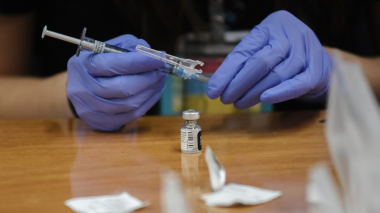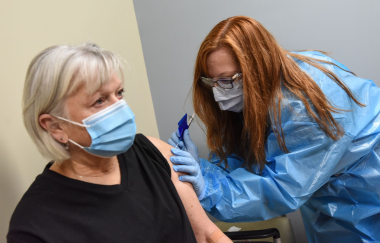When it comes to health, coronavirus remains front and center in many people’s minds – but that doesn’t mean other serious medical conditions, like heart attacks, will wait until a more convenient time.
At Atrium Health, our facilities are providing “COVID-safe” care, built on our clinical expertise and the latest guidelines. At all locations, we screen patients for COVID-19 symptoms and have dedicated areas for patients who are suspected or test positive. We’re offering rapid COVID-19 testing, and we have a COVID-19 Virtual Hospital which allows many patients to receive care from their own homes.
A new approach to heart attack care
At hospitals throughout Atrium Health, a new step has been added to the standard protocol when treating patients with chest pain: evaluating them for COVID-19.
“Because COVID-19 can mimic heart attacks on an electrocardiogram (EKG) and, to some extent, heart attacks and COVID-19 can have overlapping symptoms (such as tightness in the chest area), patients with cardiac symptoms now get an EKG and a COVID-19 screening. It’s an expedited evaluation that really helps us determine the best course of care,” says Dr. Downey.
Before COVID-19, when a patient with STEMI came to the hospital he or she would have gone directly to the cardiac catheterization lab for treatment. Now, there’s a new, quick screening in the Emergency Department (ED); there, if there is any concern for COVID-19 infection a bedside ultrasound is performed as part of the COVID-19 screening process.
According to William Downey, MD, the Vice Chair of Quality and Care Transformation at Sanger Heart & Vascular Institute, “We’re making sure that we’re treating the right problem and providing the right care, without delaying care for the patients.”
Collaboration among teams in the Emergency Department and Sanger Heart & Vascular Institute is crucial, as every minute counts.
David Pearson, MD, MBA, MS, the Chief of Quality, Operations, and Innovation at Atrium Health’s Carolinas Medical Center says, “We’ve implemented many measures to make sure the environment is safe in the Emergency Department, including providing masks to all patients and visitors upon entering and immediate screening for COVID-19. Potential COVID-19 patients are then treated in dedicated areas.”
James Conner’s story: “I woke up one night in severe pain”
James Conner is a 51-year-old man who woke up at 2 AM in April with chest pain and nausea.
“At first,” James says, “I felt like I was having some bad indigestion, but when I couldn’t get any relief I started to get worried. I was really in severe pain. Fortunately, my wife remained calm and called 911.”
Shortly after, an ambulance arrived at James’s house. James went into cardiac arrest while he was in the ambulance and received defibrillation (a shock to the heart). He was transported to Atrium Health Pineville, where he was defibrillated once again upon his arrival.
Because of the concerns about coronavirus, extra precautions were taken to screen James for the disease. Due to visitor restrictions adopted by hospitals across the region, his wife and son did not come into the hospital with him.
“While I was at the hospital, I noticed every person I saw was wearing gloves and masks, being very vigilant about protecting the patients and staff. It was different not having family members there, but I understood the reason why,” says James.
It turned out James was having a STEMI (ST-Elevation Myocardial Infarction), a very serious type of heart attack. His heart was operating at only about half of its normal capacity for pumping blood. But thanks to quick treatment James is now making strides in his recovery journey.
After spending several days in the hospital, James is now home and is keeping up with his cardiac rehabilitation, which is being done Virtually by phone and video.
“If my wife hadn’t called 911, if EMS hadn’t come right away – I wouldn’t be here,” says James.
Having symptoms? Don’t wait
“Nationally, there’s been a 40 percent decline in people going to healthcare settings with heart attacks, because they’re scared to go to a hospital. But the benefits of rapid treatment for cardiac emergencies greatly outweigh the risks of exposure in the healthcare setting,” says Dr. Downey.
Bottom line? If you experience any serious symptoms like severe pain, nausea, shortness of breath, tightness in the chest, seek medical attention immediately by calling 911.
Learn more about Atrium Health’s Sanger Heart & Vascular Institute heart attack care.
Learn more about Atrium Health’s initiatives to care for COVID-19 patients at AtriumHealth.org/Coronavirus



